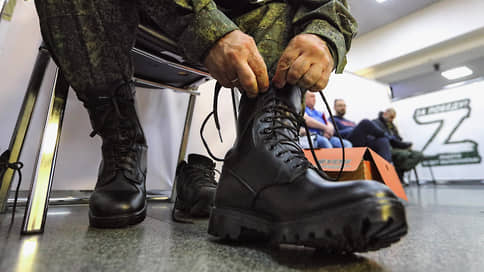Social obligations of special purpose – Newspaper Kommersant No. 20 (7465) of 02/03/2023
[ad_1]

Due to mobilization, Russian companies lost about 1-3% of employees at each enterprise and were forced to bear additional costs for the psychological, financial and legal support of those called up and their families, follows from a survey by the Association of Managers. In the future, enterprises are also preparing to launch adaptation programs for those who have served, primarily psychological and medical ones.
A significant part of Russian companies provided their mobilized workers and their families with financial, legal and psychological assistance and are ready to develop programs for their adaptation to work after the end of military service, showed a survey (more than 200 enterprises from different regions of the Russian Federation) of the Association of Managers (which unites representatives of Russian large and medium business). Recall that the “partial mobilization” by Vladimir Putin’s decree of September 21, 2022 affected 300 thousand reservists, mostly men aged 20 to 35 — the economically active part of the population — provoking a shortage in a number of specialties in the labor market (see. “ Kommersant, November 19, 2022), which probably explains the attention to mobilized employees that companies declared during the survey.
Thus, the majority of respondents said that they provide financial assistance to the mobilized (57%), another 43% reported the purchase of necessary things and equipment, 30% – legal and 13% – psychological support. Only 13% of surveyed enterprises declared the absence of such programs. The share of companies that declared support not only for the mobilized themselves, but also for their families, was expectedly lower, but significant – 40% of the surveyed enterprises announced financial assistance to families, another 20% have psychological assistance programs, 5% said they provide targeted assistance at the request of employees. Some companies also have formats for working with those who have not yet been mobilized, but are subject to the requirements of conscription – 28% said that they provide them with personal psychological and legal support, 13% “limited themselves to general consultations on key issues.” In the future, a number of companies are ready to provide psychological and, if necessary, medical assistance to those mobilized who have served (9%), another 38% stressed that they would provide such support upon request. A third of companies noted that they are considering the introduction of such programs right now.
Answering the question about budgets to support the mobilized and their families, a third of the responding enterprises answered that up to 500 thousand rubles were spent for these purposes, 21% of the respondents had expenses exceeding 5 million rubles, 16% announced spending in the range of 500 thousand – 1 million rubles. It should be noted that, although the amounts of the new item of expenses of companies in themselves are not comparable with spending on traditional types of social support – such as VHI – taking into account the relatively small share of mobilized at each enterprise, the costs per person could be significant. So, according to the survey, almost half of the enterprises mobilized 1-3% of workers.
As Elena Dybova, vice-president of the Chamber of Commerce and Industry, emphasized in a conversation with Kommersant, small companies reacted to the mobilization of employees in a similar way – many companies supported them, including by purchasing the necessary equipment. “It would be right if enterprises were given the opportunity, by transferring any payments to the families of the mobilized, not to pay social contributions,” says Alexander Kalinin, head of Opora Rossii.
[ad_2]
Source link






